| Reviews & Columns |
|
Reviews DVD TV on DVD Blu-ray 4K UHD International DVDs In Theaters Reviews by Studio Video Games Features Collector Series DVDs Easter Egg Database Interviews DVD Talk Radio Feature Articles Columns Anime Talk DVD Savant Horror DVDs The M.O.D. Squad Art House HD Talk Silent DVD
|
DVD Talk Forum |
|
|
| Resources |
|
DVD Price Search Customer Service #'s RCE Info Links |
|
Columns
|
|
|
Targets (Warner Archive Collection)
"What you hunting this time?"
"Going to shoot some pigs."
Warner Bros.' Archive Collection line of old Paramount DVD releases hard-to-find library and cult titles has released Targets, the 1968 directorial debut of Peter Bogdanovich, starring Boris Karloff, Tim O'Kelly, Arthur Peterson, Monte Landis, Nancy Hsueh, James Brown, Mary Jackson, Tanya Morgan, Sandy Baron, and Peter Bogdanovich himself. A thriller conceived out of studio contract necessity as a patchwork quilt of horror and contemporary suspense elements, and much later received as a prescient commentary on gun violence in late 1960s America, Targets is knowingly melancholic and cynical when focusing on retiring classical horror star Karloff's subplot, and undeniably startling and unsettling when aimed at the opposing Charles Whitman-inspired mass murderer angle. How well these two themes are merged together here--and more importantly how effective their messages--is open for debate. Why the WB Archive keeps re-releasing old DVD titles that are still readily available is anybody's guess (you're telling me they've run out of library titles that have yet to see the DVD light of day?), particularly when they want you to pay a lot more here for the exact same release that went for peanuts back in 2003. A director's commentary track and intro are included in this rich widescreen transfer.
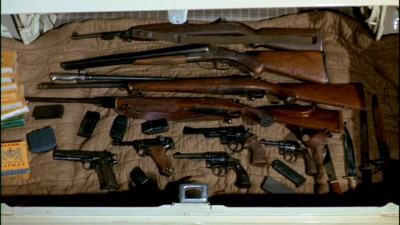
Old-time Hollywood horror icon Byron Orlok (Boris Karloff) has had it: he won't do B-movie director Sammy Michaels' (Peter Bogdanovich) upcoming picture, no matter how good a boy Sammy is to him. Orlok's image of himself as a past-it hambone gains added strength from the newspaper headlines: who needs Orlok's specialty of Victorian horror, when far more terrifying realities, such as massacres in the most mundane places, are trumpeted on a daily basis? Ready to chuck it all away, including an upcoming personal appearance at a L.A. county drive-in to promote his latest--and last--Michael's effort, Orlok is eventually brought around to at least completing that obligation before he retires. Meanwhile, all-American failure Bobby Thompson (Tim O'Kelly), an ex-serviceman married and living at his parents' home, has had it: "funny ideas" are plaguing him, and he has no idea how to deal with them. He'd like to talk to his wife, Ilene (Tanya Morgan), but she's late for work. His father (James Brown) doesn't seem like the kind of guy who's going to ask Bobby to share his feelings, while Bobby's mother (Mary Jackson), smoothes his hair, worries about how late he's staying up, and calls him a "good boy." So...the next morning Bobby promptly shoots his wife, his mother, and the unfortunate delivery boy in their kitchen, and then sets off on a shooting spree, first at the valley freeway, and then, the Reseda Drive-In...where Byron Orlok is making his last personal appearance.
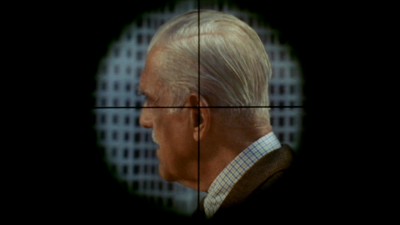
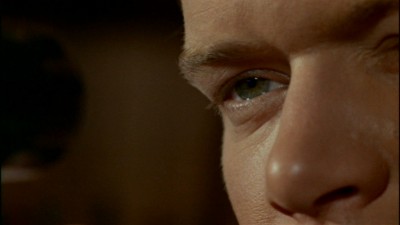
Most hard-core movie fans are familiar with Targets' rather interesting production history, but a little background for newcomers to this title wouldn't hurt. According to director, screenwriter, and co-star Peter Bogdanovich, the former film journalist-turned-production assistant to famed B-producer, Roger Corman, was offered a plum assignment by the legendary moviemaker: shoot two days worth of anything with star Boris Karloff, days which Karloff still owed Corman from a previous contract. Corman suggested that Bogdanovich shoot twenty minutes of new Karloff footage, combined with 20 minutes of footage from the Corman/Karloff hit, The Terror, and with 40 minutes of whatever story Bogdanovich could concoct to link everything together. After initially planning a straight horror story where Karloff would don a "youth mask" and strangle people in a supermarket, the story was changed drastically with the uncredited aid of director Sam Fuller, a personal friend of Bogdanovich (Fuller reportedly refused Bogdanovich's request he take credit for his significant contributions). Karloff, surprised and pleased with the quality of the new script and the progress of the shoot, agreed to continue on past his contractual obligation of two days (he shot for five), and after a total shooting schedule of 22 days, Bogdanovich spent half a year cutting the movie. When Corman requested a release through his usual distribution partner, American International Pictures, Bogdanovich asked instead to find a big-studio buyer for a potentially wider release, a plan that Corman readily accepted when Paramount, buying the pic for $150,000, handed him an instant $25,000 profit on his investment. Real-life violence, however, in the form of the assassinations of Robert Kennedy and Martin Luther King, Jr., caused an almost year-long delay in Targets big-screen debut, due to disagreements at Paramount over the wisdom of releasing such potentially disturbing subject matter. When Targets was finally released in August, 1968, it drew a few excellent notices, notably from Howard Thompson in The New York Times, but very few ticket buyers, and quickly disappeared. Bogdanovich's career as a moviemaker, however, was set into motion (of all the "New Hollywood" directors, except for Michael Cimino, his rise and fall was the highest, fastest...and shortest), while word-of-mouth over the decades built up a minor cult status for the director's debut feature.
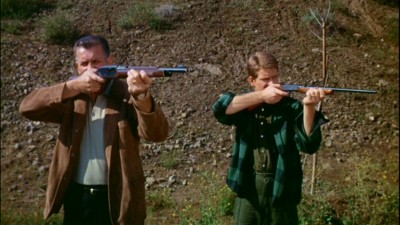
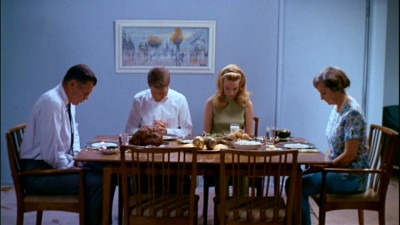
Back when I was in high school, someone bought me Danny Peary's terrific Cult Movies book, and I became obsessed with seeing every title listed there, including Bogdanovich's Targets, which I was lucky enough to catch at a revival house a few years later. Despite being a huge Karloff fan as a kid, what initially struck me when watching the movie were the Tim O'Kelly segments: Bogdanovich's cold, disquieting take-off on mass murdering in late 1960s America, Charles Whitman-style (as well as the less well-known Michael Andrew Clark, of the notorious California Highway 101 sniper attack in 1965). Being in "film school" at the time (yeech), I certainly got the connection and contrast Bogdanovich was trying to make between the quaint screen horror of Karloff's movies like The Terror, and the sickening corporeality of a "real-life" shooting massacres that were becoming more highly publicized in torn-apart 60s America. When Bogdanovich has his serial killer O'Kelly shoot victims literally from inside a drive-in movie screen, and then has a confused, terrified O'Kelly look frantically back and forth from the huge, menacing screen image of Karloff stalking him, to the reality of frail-but-determined Karloff coming across the drive-in parking lot straight for him, you certainly don't need a "film degree" to understand what Bogdanovich is getting at here.
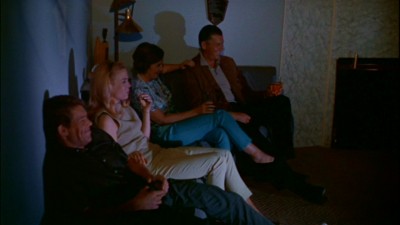
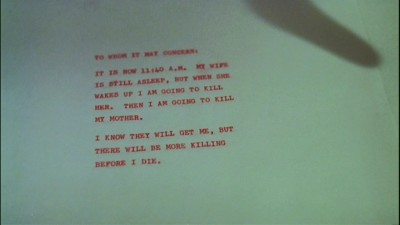
And on that level, in the immediacy of the movie experience, Targets plays well enough. Taken separately, the movie's two subplots work quite nicely. Bogdanovich's script (with an assist from then-wife and production designer, Polly Platt) gives the Karloff scenes a doleful yet snappy, cynical tone that was deliberately designed to resemble all those Howard Hawks movies the director so dearly loved, while the satire of the soulless, money-obsessed B-movie production world is amusing, and no doubt, spot-on (Soap's Ed Loughlin has a poignant scene as a gentlemanly P.R. hack shattered by Karloff's betrayal, while The Monkees' Monte Landis delivers a grossly-funny turn as a seemingly ass-kissing producer ready to insult the recalcitrant talent at the drop of a hat). How well that particular subplot is married to the Charles Whitman-like material is subject to discussion, though; it's certainly an intellectually clever construct...but never a really believable, organic graft. You can extrapolate that marvelous recount of the "Appointment in Samara" story by Karloff as fatalistic foreshadowing of the movie's finale all you want, and you can love all those mournful shots of the dapper, fading star, bemoaning the downward spiral of the world, too...but there's no denying that the Karloff scenes at the hotel, although beautifully played by the beloved star, approach "padding" more often than not, slowing down the pace of the movie, and offering little, in the end, that directly relate to the movie's central theme about violence.
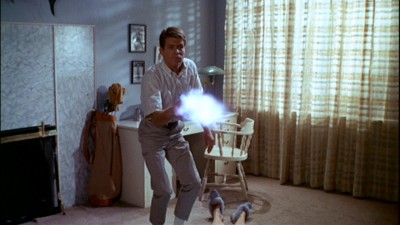
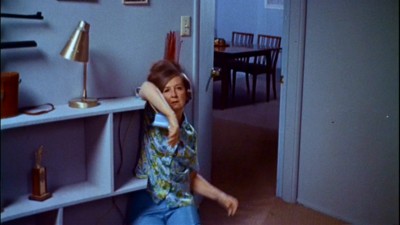
The real visceral power of Targets comes in the deceptively bland, nightmarish world of killer O'Kelly that Bogdanovich so artfully creates here. Most critics have commented on the movie's determined lack of motivation for O'Kelly's crimes...before proceeding to blithely supply their own (as critics, including this one, are always wont to do). In this DVD's commentary track from Bogdanovich, recorded in 2003, he casually mentions, with a vague brevity that seems like afterthought, that "we" (one assumes himself and Platt) had hoped to shed some light on the issues of too-easy gun ownership in America when making Targets. Certainly one can come away with that view...if one is already coming from that viewpoint. Targets' deliberately hazy viewpoint when it comes to what, exactly, it's saying about O'Kelly's character and his homelife, allows for a lot of speculation on a critic's or viewer's part. Quite a few critics are genetic disposed to start bemoaning the American veneration of guns, God, and country amidst the sterility of suburbia when they see those stark, bare, ice-cold blue walls of O'Kelly's home, the arsenal of weapons he possesses, and while watching the so-called "empty rituals" of middle-class American life, such as the family praying before a meal, or father and son target practicing, or the family gathered to watch silly late-night television. Certainly, one can make some bemused critical jumps as to what Bogdanovich might be saying in these scenes; watching this again last night, I started to crack up when I noticed how much of Bobby's material world is second-rate: not the "real thing" Coke but Pepsi-Cola; not a true "muscle car" but an underpowered "pony" Mustang; not a "real man's" rifle like his father's, but a child's .22; not a Johnny Carson talkfest on the tube, but a poor man's Joey Bishop.
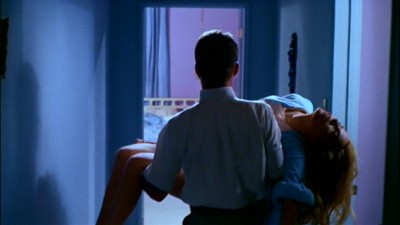
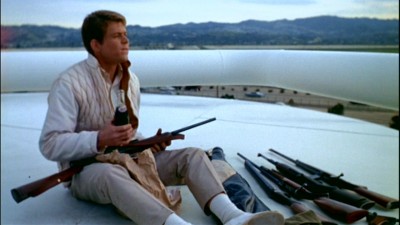
However, when making those assumptions, it's important to remember one is doing so in a deliberate vacuum of Bogdanovich's creation (and it's important for the gleeful kickers of the "bitter clingers" to see he leaves clues of Bobby's family's normalcy, too: Dad may be authoritarian, but he does reach out to Bobby to share time together; Mother may still refer to this grown man as a "good boy," but she does so with what appears to be genuine affection...as do a lot of mothers; and Wife does offer to listen to Bobby, after coming home from her late shift. It's Bobby who ultimately spurns these advances). To someone growing up in an rat-infested slum or a podunk hick town, or to a foreigner coming to America from a truly oppressive country...Bobby's SoCal dream world right out of the pages of Look magazine, may indeed look like a veritable paradise--which would only serve to emphasize that what is wrong with the world is maybe not so much some critics' take on that world itself...but that anonymous, "light switch on-and-off" killers like Bobby, are in it. The surreal power of these waking nightmare scenes comes precisely from that open-ended thematic foundation: they can mean anything you want them to mean...just like your own dreams and nightmares (designer Platt deserves as much credit as Bogdanovich's sinuous, gliding camerawork, courtesy of master cinematographer, Laszlo Kovacs).
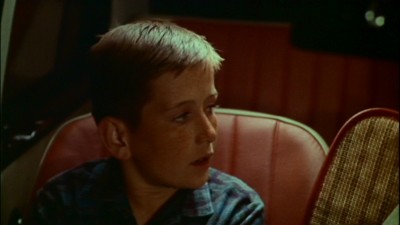
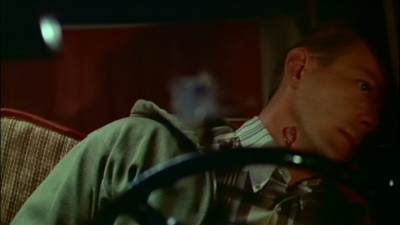
Watching Targets, particularly in a big theater, on a big screen, those moments in the Thompson house (the killings of Bobby's mother, wife and the local delivery boy reminded me of the blank, grotesque, absolute finality of Laurence Harvey's killings in Frankenheimer's The Manchurian Candidate), and the subsequent shooting sprees, are spellbinding in their stripped-down, bare essentials, low-budget "cleanliness," if you will (preppie, scary O'Kelly is remarkably well utilized by Bogdanovich here). And that's enough to recommend Targets as a successful exercise in suspense. Whether or not the other elements work again depends on what you're already looking to get out of these nightmares. Targets's supposed anti-gun vibe is by association only, and only there to discover for those who are anti-gun to begin with: one Bobby or even ten Bobbys and their horrendous crimes can never indict the 99% of gun owners who don't break the laws. In adapting certain aspects of University of Texas in Austin tower sniper Charles Whitman's story, Bogdanovich changes two important points to satisfy his anti-gun stance: Whitman stabbed to death his mother and wife, horrific crimes that, unfortunately, would have left Whitman anonymous to most of the world if he hadn't followed up with his shooting massacre (in the movie, Bobby shoots them, in the movie's most disturbing scene); and civilians with more powerful weapons than the police held Whitman at bay with cover fire that, according to the police, saved many lives and allowed them to eventually take down Whitman (Bogdanovich shows some of the drive-in customers getting their guns...but retribution comes in the form of some slaps from Karloff--intellectually and aesthetically satisfying within Bogdanovich's artistic vision of a fearful boy getting his comeuppance from "Daddy" Karloff, but hardly realistic considering Bogdanovich portraying Bobby as a relentless killing machine). The fact that Targets' supposed anti-gun stance is neither well thought-out nor well-expressed only compounds the hypocrisy of attempting to include it in a suspenser that delivers its "thrills" through the sight of people getting shot like tin cans, anyway (and don't give me that Bobby's shooting sprees aren't inherently "exciting"--that's the old Peckinpah criticism all over again...). Targets' bifurcated storyline, deliberately open-ended motivation that encourages critical leaps of faith (and thus playing it "safe" with those critics looking to see their own thoughts on the screen) , and vague, fuzzy, hypocritical noodlings with form and content, still doesn't take away from the power of Targets' suspense/action sequences. It's only too bad that the one message Bogdanovich explicitly states in Targets--real-life horrors are worse than big-screen boogeyman's--was so obvious, even in 1968.
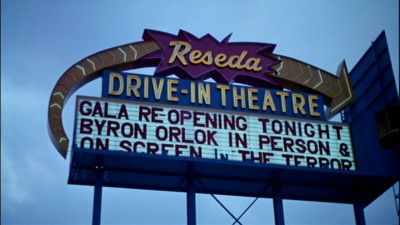
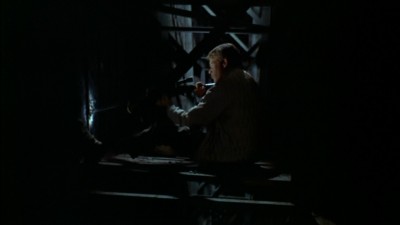
The DVD:
The Video:
Utilizing the same transfer as the 2003 Paramount disc (even down to the Paramount logo, not the WB), the 1.85:1 anamorphically widescreen transfer looks quite good, with minimal grain, generally good color, a sharpish image, and no serious compression issues to speak of here (Bogdanovich states in his commentary track, though, that the timing is a little too bright with this particular transfer).
The Audio:
The Dolby Digital English split mono audio track is serviceable and clean, with little hiss and a decent re-recording level. English subtitles are included.
The Extras:
The same extras are carried over from the 2003 disc: Bogdanovich's informative commentary track, and an introduction that covers many of the salient points in the commentary.
Final Thoughts:
Whatever message Peter Bogdanovich was sending with Targets gets lost in the patchwork quilt construction of the two different subplots here...along with some deliberately cagey fuzziness. Still, the cold, nightmarish scenes of our all-American psycho sniper killer Bobby calmly eating a Baby Ruth and drinking a Pepsi-Cola while wasting his family and a drive-in theatre full of people, is still shockingly potent today. I'm highly recommending Targets...but you don't need this Archive Collection disc if you own the 2003 Paramount release.
Paul Mavis is an internationally published movie and television historian, a member of the Online Film Critics Society, and the author of The Espionage Filmography.


|
| Popular Reviews |
| Sponsored Links |
|
|
| Sponsored Links |
|
|
| Release List | Reviews | Shop | Newsletter | Forum | DVD Giveaways | Blu-Ray | Advertise |
|
Copyright 2024 DVDTalk.com All Rights Reserved. Legal Info, Privacy Policy, Terms of Use,
Manage Preferences,
Your Privacy Choices | |||||||












